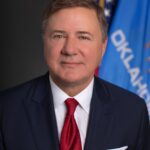Oklahoma Attorney General Genter Drummond calls on the Oklahoma Legislature to override several vetoes issued by Governor Kevin Stitt as the legislative session draws closer to its final day. Drummond points out that lawmakers have worked hard to put good policy into place only to be rejected by Stitt.
 “Our lawmakers have done a tremendous service for the people of Oklahoma through the passage of many of these bills,” Drummond said. “The legislation at issue would strengthen public safety, sharpen government transparency and accountability, ensure appropriate healthcare, and much more. The power is with the people, and the people are most directly represented by the men and women they have sent to the House and Senate. For the sake of making certain that the Legislature remains a co-equal branch of government, it is my hope legislative leaders strongly consider overriding these vetoes, many of which are simply baffling and bizarre.”
“Our lawmakers have done a tremendous service for the people of Oklahoma through the passage of many of these bills,” Drummond said. “The legislation at issue would strengthen public safety, sharpen government transparency and accountability, ensure appropriate healthcare, and much more. The power is with the people, and the people are most directly represented by the men and women they have sent to the House and Senate. For the sake of making certain that the Legislature remains a co-equal branch of government, it is my hope legislative leaders strongly consider overriding these vetoes, many of which are simply baffling and bizarre.”
As of May 22, Stitt has vetoed 45 bills for the session.
“These vetoes, a number of which are plainly inexplicable, clearly show the Governor’s contempt for the legislative process,” Drummond said. “He has utilized the veto pen far more often that his predecessors and routinely criticizes the Legislature for the bills that land on his desk. No Oklahoma Governor in recent history has issued as many vetoes as he has.”
The Attorney General noted that much of the vetoed legislation this year received veto-proof support in the House and Senate Chambers.
Drummond, who is running for governor to succeed Stitt, encourages the Legislature to take up override votes on all the vetoed bills but also provided a suggested list.
That list is below:
HB 1029 – Extends the sunset year for the Oklahoma Funeral Board. (pending action on second bill)
HB 1030 – Extends the sunset year for the State Board of Cosmetology and Barbering.
HB 1389 – Requires health benefit plans to cover supplemental examinations and imaging to screen for breast cancer.
HB 1592 – Creates a new crime of organized retail crime, which includes retail theft committed across multiple municipalities and reestablishes the Organized Retail Crime task force to facilitate law enforcement cooperation.
HB 2048 – Creates the 340B Nondiscrimination Act which prohibits health insurers and pharmacy benefits managers from reimbursing 340B entities for certain drugs at reduced rates or engaging in other discriminatory actions.
HB 2131 – Modifies various provisions related to grand jury transcripts, limiting their use and viewing, and establishing modified notice and hearing procedures for them.
HB 2163 – Creates a Public Access Counselor Unit within the Office of the Attorney General to investigate and process complaints and requests related to denied access to public records controlled by state public bodies besides the Legislature.
SB 54 – Adds to the list of offenses that may be considered aggravated driving under the influence and clarifies that aggravated DUI is a felony. Makes a portion of the sentence not subject to probation, suspension or deferral.
SB 574 – Allows colleges and universities to be eligible political subdivisions to receive Opioid Abatement Grants. Allows the Abatement Board to use up to 10 percent of the funds for statewide abatement projects.
SB 631 – Includes discharging a firearm into a dwelling or building used for public or business purposes as a crime which, upon conviction, convicted persons must serve 85 percent of their sentence prior to parole eligibility.
SB 773 – Removes administration of pharmacy discount cards from the definition of pharmacy benefits management, while ensuring cooperation with any investigation. Allows the attorney general to collect certain prescription data while investigating noncompliance complaints.
SB 1089 – Modifies provisions related to competency determination and ensures those accused of committing the most heinous crimes are not released from civil commitment without notice to the victims and the district attorney.


